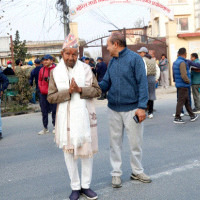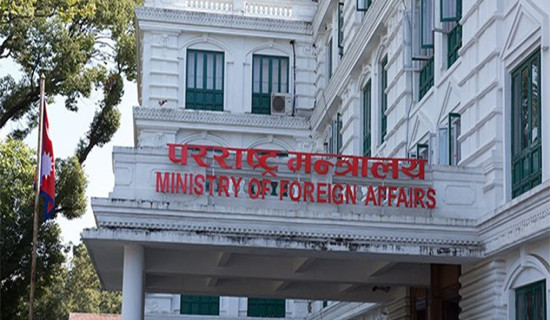- Thursday, 5 March 2026
Financing gap impacts locally-led adaptation for climate change
Kathmandu, Feb. 15: Locally led adaptation plans for climate change are facing slow progress and poor implementation in absence of required financial resources across the region in South Asia including Nepal.
Speaking at an international workshop on 'Institutionalising Locally Led Adaptation (LLA) in South South Asia' that concluded on Friday, the experts and government officials said that the local communities lack the enablers of leadership and action.
According to them, lack of enabling policies and governance structures, devolved, adequate and flexible finance, human, institutional and technical capacities, and downward accountability has significantly impacted the locally-led climate change adaptation activities in Nepal.
Suman Subedi from the Climate Change Management Division (CCMD) of the Ministry of Forest and Environment (MoFE) called on the stakeholders to ensure financial resources for the funding of adaptation programmes at the local level so that sustainable development could be promoted.
"We need to recognise that the challenges are significant which demand collaborative efforts from us in addressing them," he said.
The CCMD has a designated Adaptation Section with responsibility of preparing and implementing programmes related to climate change adaptation and mitigation, taking lead in developing climate action plans for both adaptation and mitigation, facilitating the management of climate financing, assisting in the development of climate technology, organising national and international meetings and fulfilling international reporting requirements.
Speaking at a press meet on the concluding day, Subedi stated that although efforts are underway to formulate and implement Local Adaptation Plans of Action (LAPA) in all 753 local levels of Nepal, many local bodies have not yet executed the plans. He emphasised the need for increased investment in climate adaptation, considering Nepal's high vulnerability to climate change risks.
Highlighting the significance of the workshop, he noted that it provided a crucial platform for sharing experiences among various institutions in South Asia working on the same issue. "Such programmes help make Nepal's environmental conservation, climate change mitigation, and adaptation plans more relevant to the times," maintained Subedi.
Poor execution of adaptation programmes
"Most of the adaptation plans are prepared by the experts and consultants and they seldom go into actions because local bodies lack the expertise needed to execute such plans," said Joy Elamon, Member of Kerala State Disaster Management Authority of India while stressing the need for capacity development of the local governments and communities.
He pointed to the need to create ownership of the local communities in adaptation plans and incorporate private and non-profit sectors in the process.
Likewise, Susan Shen, Director of Asia Programme of the Global Centre for Adaptation (GCA), recommended integration of the national development plans with the local ones, exploration of the opportunities for alternative mode of financing such as self-help initiatives and implementation of public and private partnership strategy to make the locally-led adaptation more effective and result oriented.
"For the countries like Nepal, exploring financing opportunities with the multilateral donors like the Asian Development Bank and World Bank can be a starting point as they have started financing in climate projects," said Shen, adding that African Development Bank has made a few successful investments in such projects.
According to her, a global data hub will be created to share the good and successful practices in community-led climate change adaptation programmes and projects so that it could be shared with the communities across the globe. Shen also pointed to the need to enable and empower the communities for the same.
Skilling up communities
Samjhana Bista, Country Director of DCA in Nepal, said that building adapting capacity of the community with enhanced green areas and government investment in such initiatives would be instrumental in improving the situation.
She also stressed simplification of the knowledge in this area so that the communities and people at the grassroot could be benefitted.
However, scaling up and institutionalising LLA continues to be a challenge despite history of promoting devolved governance and community-based action, said Anju Sharma, Global Lead, Locally Led Adaptation of GCA. According to her, poverty and geophysical factors also contributed to the vulnerabilities in the region.
Likewise, Vincent Gainey, Climate Resilience Advisor at the Foreign Commonwealth and Development Office (FCDO), said that viability of getting climate finance for the local bodies, local adaptation and support programmes had not been easy but there existed many opportunities in this regard.
"The UK has many programmes being implemented in many countries supporting vulnerable communities in locally-led climate change adaptation. For example, Bhutan is moving to the next stage of such initiative. We have also been supporting such programmes in Nepal," he said.
FCDO’s Climate Advisor, Yugan Manandhar, cited the example of FCDO establishing an emergency fund based on internal risk assessments for disaster risk management. He suggested that such a fund could be further institutionalised at the government level and utilised during times of disaster.
He further stated that creating public-private partnerships for this purpose would make the initiative more effective and sustainable.
Leadership of community
Organised by the GCA and DCA in collaboration with the MoFE, the three-day workshop was attended by the government and civil society members from various countries from the region and beyond.
The workshop saw the participation of representatives from Nepal as well as other South Asian countries, including India, Pakistan, Bhutan, Sri Lanka and Bangladesh, along with representatives from government and non-governmental organisations working in this sector. Group discussions were held across eight different sessions related to local adaptation programmes.
The workshop featured discussions on issues such as food security, water resource management, urban development, and climate finance. It also discussed nature-based solutions to build community resilience, institutionalising locally led adaptation, and leveraging private sector finance for it.
Decades of experience and learning in the development and environment sectors have shown that when enabled and empowered, communities are not only the victims but also are very effective leaders in finding and implementing solutions to address local challenges, the organisers said.
"Their integrated understanding of their needs and priorities, combined with local knowledge (including of social and political norms), puts them in a unique position for tailoring locally-appropriate, innovative, effective and sustainable solutions," read a note from them.
Meanwhile, South Asian countries have a strong history of supporting locally led action, and now, locally led adaptation (LLA). Bangladesh was one of the first countries in the world to set up a national climate fund – the Bangladesh Climate Change Trust Fund – resourced from national budgetary sources to fund activities on the ground. Nepal pioneered Local Adaptive Plan of Actions (LAPAs), and with Bhutan, is pioneering the LDC Initiative for Effective Adaptation and Resilience (LIFE-AR).











-original-thumb.jpg)




